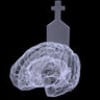From Non-Life to Life... Fron Non-intelligence to intelligence
The naturalist's perspective that life could come from non-life, and intelligent life from non-intelligent life is so simplistic as to defy logic and reason. The nature of life and intelliegnce is so complex for them to be expressed in such a seemingly simple concept called "evolution by natural selection". Life's perplexities, and intelligence's perspicacities cry for a more intersecting and integratng explanation as "the laws of physics lording it over all of nature", and therefore whatever results from that are all naturally derived, so no need for a more sublime etiology. Which leaves a lot of gaps that need to be filled.
Science have mightily tried to fill those gaps, but the more scientific "explanations" are proposed, the more it becomes obvious that science comes very short indeed.
Therein lies the conundrum.The assertion here is that life is SO SPECIAL and SO COMPLEX that its a special case that requires the supernatural as an explanation but this is, quite simply, complete and total BS.
Life is chemistry. If you think chemistry requires magic to work, or is unexplained within a naturalistic world view, than I don't know what to tell you.
You mention the perplexities of life that BEG for a more elegant explanation. Such as what? Consciousness? I fail to see why consciousness needs an explanation that goes beyond naturalism. It is probably the biggest gap that is exploited by believers in the supernatural and yet when the explanation is found it will assuredly be a natural one, just as every other time we've ever sought the answer to any mystery within nature.@Titen:
A very perceptive hubber (who was not necessarily a theist) proposed the following arguments: "The genetic code is a set of instructions and information; the set of instructions and information invokes intelligence; therefore the genetic code is intelligence."
"All living things are developed via the genetic code; the genetic code is intelligence; therefore all living things are developed by intelligence."
If you ask me, therein lies the simple and quite elegant explanation.And BTW, as far as I am aware of there has never been a chemistry lab that has been able to duplicate a "genetic code" of any importance that has led to life.... how much more intelligence.
DNA is not "intelligence", that's not even a meaningful statement.
Chemistry is natural, it is governed by natural processes. There is nothing supernatural or artificial about the function of the DNA molecule and DNA does not contain "information" in the sense creationists mean when they say it.
Our intelligence, btw, its a product of nature. If you want to propose intelligent design of some sort the best thing to do is avoid the addition of the supernatural altogether.
There are lot's of unknowns out there, no one is going to deny that, but the supernatural is never the best answer, hell, its not even the best place-holder for a real answer.@Titen:
You opened the subject of consciousness in your riposte. Naturalism and Theism have two opposite views of consciousness not only as it relates to the existence of "Free Will", but also, and ultimately to the purpose of human existence.
Theism and naturalism are two powerful accounts/interpretations of the nature of the cosmos. I agree that there is a common ground between the two-- for example, both affirm the existence of a stable physical world with laws of nature-- but they differ profoundly on fundamental matters one of which is the nature of consciousness.
On one hand , naturalists tend to hold that there is no more than the physical world. Some of your cohorts even think that the physical world is whatever is disclosed in an ideal physical science, which purposely excludes the existence of conscious persons with free will and moral lives. Others are more introspective and accepting of the idea that there is more to the cosmos than what is disclosed in the physical sciences. This subset of naturalists hold that conscious persons with free will and moral lives have emerged through non-purposeful, evolutionary processes, where these emergent phenomena are not completely reducible to the physical structures of the cosmos. Most if not all naturalists today insist, however that the cosmos itself is not explainable in terms of purpose or teleology. They maintain that the processes that brought about and sustain the cosmos were and are blind, not being guided by a preconception of some goal or end.
The above ideas are anathema to theists, because we see the whole cosmos as ultimately explained in terms of a conscious, purposive, divine reality. In theism, God and the cosmos are not on an equal footing in terms of their being; the cosmos exist contingently (not tangentially), and thus neither its coming to exist nor its continued existence from moment to moment is necessary. God's existence is necessary; it is not derived from any law of nature, he is therefore above any laws of nature.@Titen:
I totally agree with your conclusion that "DNA is not intelligent" but only in so far as the term intelligence applies to humans and other sentient beings.
There is another, and may I say subtle/succinct, definition of intelligence, and this applies to the DNA helix. "Intelligence" involves or invokes the ability to sense the environment and adjust accordingly their morphology, physiology and phenotype". By this definition, the DNA helix is "intelligent"DNA only reacts in this way based on natural selection however, in that those better adapted to their environment or a recent change in that environment will survive to pass on their genes, so if you want to claim that it is intelligent you can only do so on a technicality at best.
It is a remarkable molecule, no doubt, but then the Universe is filled with amazing wonders, many still undiscovered, which is why I choose not to spoil those wonders with fantasies of magic (not saying YOU are suggesting magic, just in general)#titen:
Technicality or not, the designer of the DNA helix was supremely confident that given the provocations of the environment, the DNA would purposely react in one way, or another, or another to make sure that whoever owns that DNA will continue to exist.
This natural selection process, if I may say so has gone full circle. Initially it was the environment that provoked mutational changes in the DNA that may have (or have not) had any beneficial effects on the organism. Now, that this organisms (i.e. humans) have achieved the fullest expression of their ability to cerebrate, they are now provoking changes in the environment that may or may not have beneficial effects on the environment, and therefore may or may not have beneficial effects on themselves.
Don't be silly - DNA cannot change it's physiology OR its phenotype. It can only (barring mutations from outside) duplicate itself exactly. Nor can it sense it's environment any more than a salt crystal can.
Wilderness:
Analogizing the DNA helix ( the foundational basis for all the living entities on earth) to a salt crystal is like comparing Leonardo Da Vinci to the corner "artist/painter" in your local market. As molecular enttiies go the DNA is the most reactive/interactive of all; as chemical entities go, the salt crystals is one of the most inert ....unless of course if you are using it to season your food.@wilderness:
As you know evolution via natural selection would never exist without tjhe DNA undergoing mutational changes... and what are mutational changes but changes in the DNA's phenotype, physiology and morphology.
A hydrogen molecule contains the same kind of "instructions" to make water as DNA does to make a cell (in the presence of oxygen it combines to make water). Does that mean that there had to be a god to make those instructions, too?
That you cannot understand how it could happen does mean it is illogical; it means you can't understand it.
And yes, chem labs have reconstructed destroyed DNA and produced a living organism from it, all from off the shelf chemicals.Wilderness:
Hydrogen atoms (2 of them in fact) have this peculiar propensity to bind with a single oxygen to make water. Nothing intelligent in that scenario, just pure chemical reaction..... which could not be said of the base amino acids that makes DNA and its partner in "crime", so to speak, tRNA, the crime being the production of copies of DNA that allows for the unlimited production of cellular structures (carbohydrates/proteins/ triglycerides and various enzymatic molecules that increase or decrease cellular metabolism, as the need arises) that makes our organ systems.
"Chem labs have reconstructed destroyed DNA and produced a living organism from it" is obviously within the realm of possibility, the operative word being the presence of DNA. Without DNA, no matter how much these chemistry labs try to create living organisms by mixing atoms in varying combinations, CAN and WILL NEVER succeed in creating DNA that then leads to "living organisms".So the chemistry of hydrogen is different than the chemistry of a DNA strand composed of different atoms.
Can you explain how the chemistry involved is different? Certainly, what you are calling "information" is nothing of the sort, just chemical properties that we can watch perform for us.
"Without DNA, no matter how much these chemistry labs try to create living organisms by mixing atoms in varying combinations, CAN and WILL NEVER succeed in creating DNA that then leads to "living organisms"
Quite a statement, and certainly not one I would EVER deign to make. My fortune ball is broken most of the time.
But can you provide proof of that statement beyond your personal, built in crystal ball? What evidence are you using to predict what man can or cannot do in 1,000 years? Considering that we have already taken a partial strand and rebuilt to it full size whereupon it energized a cell and was alive: man built DNA, from scratch and shelf chemicals, attaching it to more DNA to make a complete string while you claim it will never be done.@wilderness:
When it suits your argumentative purpose you are more than willing to devalue and degrade Homo Sapiens in the other forums that we've had debates on similar subject matter, but now that you need to bolster your contention, you are saying that human's are a supreme specie capable of so many wonderful and wondrous things, including synthesizing the DNA code in chemistry labs to produce living organisms.
The problem with you is as I have said before... you are neither here or there.
To make my point crystal clear... humans are capable of doing almost anything... but synthesizing DNA in the lab to produce living organisms by chemically conglomerating atoms, IS DEFINITELY not one of them.And you are mistaken.
http://www.nytimes.com/1981/11/13/us/po … erial.htmlAh, very very impressive to make a polio virus from artificial genetic material.
I think this proves something significant. It shows that intelligence with a will can create something, even something that is alive.
Imagine whatever it was that started not a virus, but the origins that resulted in this universe outside of time as we know it, with no lab nor "ingredients" of any kind, natural or synthetic.
People suppose that something non intelligent without a will of any kind could accomplish it, but look how difficult it was to get to this point with very intelligent people with all that the best labs on the planet could provide. Let us hope all people everywhere will look for a sufficient cause and effect in all things, especially the biggest things that concern us the most.Well, of course an intelligence can create - even a termite can do that! (have you ever seen the inside of a termite mound? It even includes air conditioning!)
I'm sorry, but "imagining" doesn't give an answer. At least not one that can be trusted to have any truth in it.
Why look for cause and effect? Our premier physicists and cosmologists are telling us there may have been no cause - that there was no particular need for a cause to the big bang. It may have just happened, all on it's own, as strange and counter intuitive as that may be (at least counter intuitive to those among us that are not experts in quantum mechanics).I didn't mean imagine in any way other than we don't know exactly how it happened, but we know it did happen. It is funny to me that some of the scientists out there are starting to say in effect, "No big deal, nothing to see here!" when it comes to origins! I think this is rather telling, because it is the biggest issues of all time, the biggest unaccounted for miracle no matter who is looking at it.
Normally in science, they do look for cause and effect, and normally they don't just pass off things like they seem to be doing with the universe being here vs the idea it didn't need to be.
Even termites, IF they could have been there in the beginning could have accounted for SOMETHING perhaps... but their intelligence seems to be instinctual and they don't usually go beyond what they are known to do for the sake of survival. Its like a huge wave of the hand, of disregard almost, for the whole of the universe. I won't join that crowd, and the word imagine is something you can switch out with "think hard about", the willful, timeless cause that had to be to cause this universe. The level of faith some non believers are willing to put in to this topic to avoid the screaming obvious points is very telling to me, quite astonishing really. Its fine, but its an unexpected response, when many hoped they would be open to looking no matter where the evidence led. That seems to not be the case, to move along to being so impressed with FAR less impressive things done by intelligence with everything at their fingertips that was totally absent in our beginnings. We don't have to acknowledge, but don't mind me if I do.Well, the causes of the big bang are outside our universe. Unknowable, and therefore worthy of only a wave of the hand. Interesting to speculate about, but I really suspect nothing we will ever know (unless a god did it and there is life after death with that god).
Now the pico-second AFTER the big bang - THAT'S when it gets interesting!@wilderness:
"....unless there is life after death with that God."
Of course there is life after death. For what is life on earth but a transistion from this side of the bar... to that side of the bar.
If you must know, Lord Alfred Tennyson's poem "Crossing the Bar" is the most sublime expression of the belief that life goes on after our earthly existence.
@wilderness:
The article you referenced to was published in 1981. As far as I know, the possible applicability of that research has never been moved forward towards understanding>curing>eradicating polio.
I was reading in bewteen the lines of that article, and I got the impression that the way they "chemically produced" a synthetic polio virus, was also based on mixing chemicals with a strand of a pre-existing polio DNA.
Now if you tell me that they produced that strand of polio DNA fron scratch and developed it into a fully activated and interactive, thus disease producing, polio virus... then I would call that achievment "god-like".What does curing polio have to do with creating living DNA? Just an insinuation that if we can't cure polio then we can't make DNA?
I did not get that by "reading between the lines". Either way, though, man made living DNA. Whether he used a partial, dead, strand as a starting point and finished it or made the entire strand from scratch is irrelevant. Man brought dead chemicals to life by creating DNA.. Thirty years ago, no less.
I have also read more recent reports of bacterial (I think) DNA that was chopped into pieces and killed. The missing pieces were then re-created from lab chemicals, re-attached to what was left of the dead existing strand and proved viable as a living organism.@wilderness:
Now I'm utterly confused. On one post you stated:" ....there may have been no cause". And on another post you stated: "well, the causes of the Big Bang are outside of our universe."
Another example of you frothing from both sides of your mouth... an indication that as a debater we should not take you seriously, since you seem to willy-nilly take both side of the argument, whenever the mood pleases you.OK, I misspoke. Can we change it to "any cause(s) were outside our universe" instead of "the cause"? Would that make you feel better?
@wilderness:
I gather you have idealized and formulated so many purposes for your own life, but I must tell you frankly that making me feel better is not one of them.
Perhaps, if a "Chem lab" were making very tiny changes to DNA over millions of years, they might produce living organisms. It's an easy thing to miss; time.
@Encephalo:
Certainly not a man made chemistry labYes, a man made chemistry lab. That is not a problem.
Synthetic DNA has just been created by scientists. It looks like your god of the gaps isn't the only one who can do it
http://news.nationalgeographic.com/news … e-science/It's comments like this that have me stumped.
First, there is no need for God, in the arising of complex chemical compounds, IE, DNA, and out of the same mouth we get this, "He's not the only one" that can do it. That statement asserts that God has done it, (which is denied), when man is ascribed the same accomplishment.
That in itself confirms that it took (human) intelligence, and not a little time, equipment and research, to do the same. So, man re-created, (copied) that which already is. He, (they) in effect, did nothing new, though, remarkable it is.It's like dealing with little children, you go along with their childhood fantasies in order to communicate with them on their level of understanding. Non-believers often have to do the same with believers in order to get a concept across to them they normally wouldn't understand.
Yes, it is new to man to understand how to create the building blocks of life, that which nature took millions of years to achieve.
Still stumped?Assuming, of course, that, by definition, we consider nature a "Supreme Being and principal object of faith".
I doubt anyone could show nature conceived as a Supreme Being. How would that work? Gaia hypothesis?
And, we know believers will tell us that our understanding of nature is just faith, even though we only understand nature in what it shows us, in what we observe of it.
The Biblical explanation of nature has yet to stand up to natures scrutiny, but it first has to stand up to the myriad of other religious and creation explanations before it even has a chance to even be considered valid.
Science can only answer these questions to a point, but then we are left without a sufficient answer for our origins. It makes complete sense to me that something that could be a sufficient cause would be responsible for the effect (Our universe) that we see. Possibly ruling out things in advance, no matter how ludicrous could be a matter of putting on blinders and setting the game to allow for a more favorable view to "win" over another.
When I see people discuss the particulars in these discussions, it comes down to that usually. They often end up avoiding the elephant in the room, to the point that science itself often has to take a back seat. I am not making this up, it is repeatable and can be tested, lol. It comes out in the particulars, that I have seen.
If ANY views have to rely on sheer blind faith in something without good reason, why are those things given credence more than the things they don't want to be true at times? This is a very fair question I think! Then people are really just picking over what they WANT to have faith in or not, and that isn't going where the science leads. Whatever is responsible for our intelligence and life, has to be capable of it, would think. That seems scientific to me!You're absolutely right that science does not have all the answers. The problem is that nothing else does either; making one up without any observable evidence does NOT provide any answer worth anything. "Possible" does not mean "probable" and certainly does not mean "certain".
Also right in that anything responsible for our universe WILL be sufficient cause. But again, "sufficient" does not mean "probable" and certainly not "certain". There may be a million "sufficient" causes, but which one is the one that actually happened?
I would go on and add ignorance to that sheer blind faith. Because we don't know is not a reason to make up a cause that we can then believe with sheer blind faith.
But what evidence/experimentation/tests/observation (science, in other words) makes you say that any cause of intelligence will be intelligent?Science may find those answers, given time.
We believed the sun revolved around the earth. We now have an answer.
We believed the earth was flat. We now have an answer.
We believed gods created us. We now have an answer.Well, all that is well and good, but it still looks like an eternal uncaused cause is the most likely explanation, and of things that have been revealed to humanity, it looks like the best explanation is STILL a god.
As long as you don't have any problem with others having faith either. There is much faith, where there is much faith, no matter what you call it. Putting hope and faith in something that can't even "weigh in" on the topic is just that. I can be fair and hope we all can be.
Anyone who had a clear understanding of evolution should easily be able to explain those "gaps", thus refuting evolution.
I see no explanations at all, but instead, only unfounded assertions.@Encephalo:
Without assertions, there can be no arguments.. and that is what these forums are for...argumenting and debating.But, your assertions are unfounded, there is no debate.
@encephalo:
The above post is the ultimate expression of close-mindedness that is so prevalent in the atheistic world.Close-mindedness? Most atheists I know are open to the idea of a God, we are just waiting for evidence. Most believers I know are not open to the idea that no God exists even though they have no evidence.
You claim a creator, but can provide no evidence or proof of such an entity. What we know and are learning about life can be explained by evolution.
Where is the debate?
So according to you science comes short on explaining life and intelligence. I think science does a perfect job at explaining how humans are here and I don't think the why we are here is at all an intelligent question. Do you have a better answer that doesn't beg many more questions that can be studied and verified?
And I'm going to presume you believe your hypothesis of "invisible sky wizard did it" is somehow more credible?
@Zelkiiro:
Before scientific perseveration became entrenched as the only way humans see/interpret themselves vis-à-vis the universe, philosophy gave them exceedingly appropriate conceptualization of human existence, thus straight line dissections of humanity's role in creation and the meaning and purpose of that role.
Thus to discard philosophy from all considerations, now that science seems to be providing "answers" is the height of folly. I submit that without philosophers musing about man and the universe, science would not be at the place that it now holds.All religion is philosophy, but not all philosophy is religion.
@Zelkiiro:
To the extent that philosophy may tangentially entertwine with religion (specifically with tenets that involves belief in the existence of a spiritual/transcendental existence) your statement holds a grain of truth.
Our ancient predeccesors whose scientific moorings were neither null nor void as atheists would lead us to believe, have certainly thought about what was divinely sublime about the natural world. And in so doing keenly perceived that all natutal events have etiologies that are not susceptible to purely the physicalist and or materialist interpretation.
If we are to believe
An appropriate conceptualization would be one that is correct, not the dreams of a theist wanting a god out there somewhere.
Conceptualizing and dreaming are "events" both of which involve neuronal firing. Events are caused. We, having free will, initiated the conceptualizing and dreaming, that then caused the neurons to fire, that then led my fingers to touch the keyboard on my computer to start writing these posts on Hub Pages forum to express my concepts and "dreams" that there is a God because I have a conscientious consciousness that brought forth that free will to start conceptualizing and dreaming.
No fair, no one said that! Assumptions!
So simple life and simple intelligence needed a creator but a complex life form and greater intelligence arose from nothing, or where did you say that arose from?
@Jomine:
There is nothing simple about life and its emergence, and the intelligence that went with it amongst the sentient species. Even at the most basic level of an amoeba, life as expressed in energy intake and uptake (cellular metabolism) may be more complex as the machinery that runs your car
Adaptation as proposed by evolutionary natural selection occurs mostly via mutation, which at the moleculo-cellular level involves complexities... complexities that have transformative power, beyond that which could be ascribed to simple adaptive needs alone.The most simple level is prions and viruses not amoeba and prion is just a protein molecule that can replicate.
The creator, I think you agree, is a living being more complex and more intelligent than any other life form here on earth. Your contention is simple life forms need creator but complex life need not?I never contented that "simple life forms need a creator, but complex life need not". I am suggesting that you misread my OP. Be that as it may I am of the same opinion as you... and that the cosmos and all the sentient and non sentient entities that now inhabit it, was created for a purpose... purpose being a characteristics of intelligence. Unless of course if I am misreading your post too.
Can you describe that purpose (with evidence you are correct) or is there a purpose because an intelligence created us, supported by the knowledge that there was a purpose which indicates an intelligence?
@wilderness:
If in the process of denying the existence of God, you are more than willing to argue that human existence is purposeless... then I suppose your contention that human's , in maybe another thousand years, could and would develop the temerity and perspicacity to create DNA from simply mixing atoms ( and I mean no pre-existing portions of DNA to "reconstruct) in a laboratory setting is pure hogwash.... "full of sound and fury, signifying nothing".The only purpose of human or any other animal existence is procreation. For every individual meaning or purpose is a self construct.
PS: What according to you is the purpose of humans?@Jomine:
Your rather blunt statement that "the only purpose of human or any other animal existence is procreation"... made me cringe.... no, it made my blood boil, to be similarly blunt.
Human's are NOT any other animals...I think the fact that you are now clearly enjoying the benefits of humanity's most creative achievment, i.e civilization, belies your statement that man is just another animal whose sole purpose is procreation.
As I see it, humans evolved with the most complex organ system on earth i.e. the human brain, not to procreate but to discover what are the intended meaning and purpose of their existence, and in the process re-create witnesses to God's creation.The Europeans exterminated many Native Americans and Australians. Don't your blood boil on hearing that? If so do you avoid hearing/saying that?
I can be politically correct and say children are the meaning but that is saying it just in a round about way.
Human brain evolved not only to help procreation but also to help eat and avoid being eaten and get resources that one can procreate. Your god is just the agent detection mode in overdrive, a side product of evolution.
What, according to you, is the purpose of life?Civilization marches on....if it means that some becomes "roadkill" on the way to wherever humans will take civilization further into the future, then I suppose the evolutionary law applies as well i.e. "survival of the fittest" not only physically and mentally but also culturally.
The human brain, if it's only purpose, as you are implying, is to help procreation, and "to help eat and avoid being eaten and get resources that one can procreate" ... then perhaps it should not have evolved to the extent that it did, that has then allowed humans to create civilization. In that formulation, civilization is an exercise in futility. A formulation that I totally reject... nihilism might be in your data bank... happily it's not in mine.You can reject but that doesn't make it untrue.
@jomine:
So you think man creating civilization is an exercise in futility?.
Now that is the most insanely nihilistic sentence I have ever read..... anywhere.
A lion is NOT any other animal. A gorilla is NOT any other animal. A giraffe is NOT any other animal.
No animal is a different animal. Every one has strengths and weaknesses, just as humans do. Our single real strength does not make us superior in any but that one attribute, whether you think the universe was made for us or not.
Sorry, the random forces of mutation did not evolve us to discover meaning and purpose in our existence, and it CERTAINLY did not evolve us to witness the imagined creation of the universe by an imagined god.
You continue to imagine that humanity is special, but it is all based on the idea that god created us to be His servants/children/companion or whatever. Prove the existence of your imagined god, Prove the attributes you assign to it and prove your idea of what He wants of us, and you will have gone a long ways to proving your concept of a special species on a special earth in a special galaxy. Otherwise it is just so much BS.@wilderness:
So sorry that you feel the way you feel about the non-purpose and non-meaning of human existence.
As I have said before, in your attempts to deny the existence of God, you have been more than willing to devalue human existence , degrade human pertinence, and devolve them into semisynthetic versions of their old selves by messing up with the DNA helix. A future so totally devoid of composure, because the shell that protects the sanctity of life has been laid bare by genetic exploration and experimentation.There is a great deal of purpose and meaning to a humans existence, the purpose and meaning they define for themselves and others. It is religions that offer no purpose or meaning to life as it demeans humans and life while praising and glorifying death.
Denying the existence of your god along with thousands of other gos raises humans up from the quagmire and stranglehold of religious ignorance, intolerance, hatred and bigotry, which is what it promotes of those who don't share in any one of the thousands of gods on the market.
@wilderness:
If you are asking/looking for physical evidence of God's existence... then just look at yourself in the mirror. Now if you are looking for something more esoteric, then quantum mechanics might satisfy your craving and curiosity.
From pure logic and rationality, the existence of God could be inferred by entities with the cerebral capacity to do so...on earth that's you and me. Not the simian, canine, avian specie.
Human's have developed a consciousness that is far beyond the consciousness of any of the other animal specie, in terms of its perceptive and creative abilities. Lurking behind is the other consciousness, not dependent on the physiologic equilibration of the brain, but on its own has made man aware of the non-physical nature of his existence....i.e. the spiritual kind.That's quite a funny joke, looking at yourselves in the mirror is a reflection of millions of years of evolution, that is a fact.
There is nothing in quantum field theory that even remotely suggests gods, quite the contrary.
That is ignorance mixed with superstition, not logic and rationality.
So what? Other animals have developed all kinds of traits far superior than humans possess.
Can you offer even a modicum of evidence for that claim?
And yet, humans have been living as hunter-gathers (exactly like other animals) far longer than civilizations have been around. If your god had anything to do with creating civilization, he would have done so long ago. Another failure on His part?
Lots of other animals have just as complex an organ system as humans, some even more so. You are making false conclusions from false premises.
Does all that mean you cannot describe the purpose? That "the cosmos and all the sentient and non sentient entities that now inhabit it, was created for a purpose" is just pure hogwash without any truth in it?
@Wilderness: I have told you in various forums on HubPages what the purpose(s) is (are) of human existence. So if you can not recall what I have stated in those forums...then better have your memory bank checked for holes in it. Creating DNA (from scratch and not based on pre-existing DNA) to produce "synthetic life" is definitely not one of them
Guess I'll have to have the bank checked, because you have never shown what the purpose is. You may have made a claim on what you THINK it MIGHT be (I don't recall), but never any proof of what it actually is. There is, you know, a difference between a guess or simple opinion and actual knowledge...
That you don't think the purpose was to make DNA means...what?@wilderness:
Which mean that of all the things that can make their existence on earth creatively meaningful and purposeful vis-à-vis to each other, to society, but also to the cosmos at large, messing with the basic underpinning of their genetic makeup should never be one of them. The human DNA being the basis of our physiologic, phenotypic and morphologic expression, is the sole purview of whoever created it to begin with. And humans playing with it to any degree would be counter-intuitive, and ultimately self-destructive.
It may start, simply enough with re-constructing viral/bacterial DNA from pre-existing viral/bacterial DNA, The concern of course is that once that Pandora's box is opened, it may not be sealed again, to anyone's full benefit ands satisfaction.Nothing you, I or any other human has ever done is "creatively meaningful and purposeful" to the cosmos at large.
"The human DNA...is the sole purview of whoever created it to begin with." As the is no indication there was "whoever", this statement is without meaning. Nor is it counter-intuitive (except to those that believe the myth of a creator to be true) and certainly you have no basis for saying it is self-destructive. As it has never been done in any significant amounts, you have no experience or knowledge to base the statement on.
You're right - it may not be sealed, to everyone's satisfaction (that it is open). We may create humans that can live in the depths of the ocean, opening 100 times more living space than we now have. We may create humans that can live in vacuum, opening up the moon for more. Or perhaps people that don't get cancer or lose their eyesight. That will live for centuries.
The possibilities are endless, and you have zero reason to say that any one of them cannot happen. Except, of course, for your take on that same myth again...@wilderness:
A specie whose worth you have devalued and degraded so much in the past, and even now ("..nothing you, I or any other human has ever done is creatively meaningful and purposeful to the cosmos at large") is the same specie capable of "creating humans that can live in the depths of the ocean...that can live in a vacuum... or perhaps people that don't get cancer or lose their eyesight...that will live for centuries"?.
Interestingly oxymoronic.Only if you think of the cosmos as some little park, with the dominant event the rise of humanity.
It isn't, and only a tremendous ego would ever think it is. If humanity ever occupies and populates every single planet in the entire galaxy (billions of them), it will STILL be a minor blip in a minor cluster somewhere. Not even noted by the cosmos as a whole.
You overestimate the importance of mankind by an amount that is absolutely unbelievable. Comes, I suppose, from thinking that a supernatural creator from another universe made this entire universe just for the production of human beings. You should probably work on clearing your mind of such nonsense.@wilderness:
Your post suggesting an earth populated by humans evolving NOT via natural selection but my artificial/synthetic selection is not only oxymoronic (synthetic being the complete antonym of natural) but also completely derails your self-assumed role as a naturalist par excellance. Oh the hypocrisy of it all.
I think it is you who should be "working of clearing your mind of such nonsense"... for what is more non-sensical (because it goes against nature and natural laws) than even dreaming of humans synthetically derived and formulated. Compared to my dream of humans aiming to "creatively existing in a cosmos with meaning and purpose"... yours is not only supremely reductionistic but most importantly dangerously nihilistic.
@wilderness:
Someone proposed the following arguments:
Humans are sentient; Sentience invokes consciousness and free will;
Therefore, humans have consciousness and free will.
Consciousness and free will invokes creation; Creation invokes
meaning and purpose; Therefore consciousness and free will proves God
exist. Hilarious.
Hilarious.
You need to educate yourself in fallacies, your post is nothing but:
http://en.wikipedia.org/wiki/List_of_fallaciesGIGO. Garbage in, Garbage out.
There is no indication, outside of a single species, that sentience invokes consciousness and free will, and then the connection cannot be verified as causal.
But far worse is the statement that consciousness and free will invokes creation, meaning and purpose, ending with a god. None of which has any evidence to support it at all. Consciousness and free will does NOT indicate a creator (although creation of the "thinker" is obvious) and it does NOT indicate meaning OR purpose. Certainly there is no god at the end of the chain, unless the false to fact premises are taken as truth.
PS And no, creation does not indicate a sentient creator (any more than an ant hill does) and in fact does not indicate a creator.@wilderness:
Most atheists as I understand it, DO NOT believe in the existence of "Free Will". However, there is a general and fairly universal consensus that human beings believe that they make undetermined choices for purposes and that the basis for believing this is that they are simply directly aware (consciousness) or have the experience of making such choices. So if one believes that one makes undetermined choices for purposes, then one is less inclined to be skeptical of the view that nonhuman, good, intentional agent (God) chooses to create the cosmos for a purpose.
So why do atheists and naturalists deny or doubt that we have free will? They argue that while it might be true that we fail to be aware of any causes or other determining conditions of our choices, we can not be aware of the lack of causes or other determining conditions. Naturalists argue that it is reasonable to think we cannot be aware of the lack of the lack of causes or other determining conditions of our choices because science (physics, chemistry, biology etc.) requires that we believe in the existence of causes or other determining conditions for anything that occurs in this world. Naturalists further argue that it is because science supposedly makes this regulative assumption that it has been able to make such remarkable explanatory progress in curing diseases, developing technology to enhance communications and the exploration of space etc. This argument against free will from science is what is known as the argument from causal closure, or the causal closedness of the physical worldWhat are you defining "undetermined choices" as? A choice not made? Or free will?
But either way, jumping from whatever it means to the existence of a god is really a stretch; the one has absolutely nothing to do with the other. Only AFTER the god is accepted as real can one imagine how or why it makes choices.
Some atheists and naturalists do deny free will for the very reasons you list. Why don't theists? Because their holy scriptures indicates differently so they will refuse what science discovers? Whether I believe in free will or not, I can see the point there and accept it as at least partially true; why can't a believer?@wilderness:
The argument from causal closure goes this way: Consider the movements of our fingers on the keys of our keyboards as we type our debating arguments on this forum. If we have FREE WILL, these movements are ultimately explained teleologically in terms of the purpose for making our choice to type these arguments. In other words, these movements are ultimately occurring in order that I or you can make clear our differing points of view i.e. me, in favor of the existence of Free Will, and you, the opposite.
Now according to naturalist proponents of the argument from causal closure (that's you), this purpose or reason for choosing cannot be the ultimate explanation of the movements of our fingers. So your arguments goes this way: Suppose that you are a neuroscientist (quite a stretch I think, to tell you the truth) who is seeking to discover what goes on in the brains and bodies of people when their fingers move. You might find that on occasions when people move their fingers, there are nerve impulses that reach the appropriate muscles that then make those muscles contract resulting in their fingers moving. These nerve signals likely originate in the activation of certain neurons in their brains. Now what cause neurons to fire? According to you and other proponents of the causal closedness of the physical world, we now have a quite detailed understanding of the process that leads to the firing of a neuron in terms of complex electrochemical processes involving movements of ions in the fluid inside and outside a neuron, differences in voltage across cell membranes, and so forth.
On the other hand, from the teleological perspective, the movements of my and your fingers are ultimately explained in terms or purposes, and we are AGENTS who cause movements of our fingers to occur as means to accomplishing those purposes. So there MUST BE room in the causal story for us to intervene and initially cause, say, a neuron to fire which eventually leads to the movement of our fingers.There is room, yes, for you to intervene and cause a neuron to fire. Except it is possible that there was no real choice there, that the neuron fired because it had to; the bird flying overhead reflected a light particle which entered the eye, firing the neuron there and sending an electrical jolt into the brain which then fired another neuron which chain reacted with 10 more to move the finger and type the "q" key. Or whatever.
Or maybe God fired that neuron. We will never know, and I really don't see us as a race ever being able to prove there is no free will. Or that there is, for that matter, though it is difficult/impossible to equate a god attaching each and every atom to our DNA and following that with interference at His discretion to "guide" our lives with free will.
So when it comes to free will, I choose to believe we have it. I have no proof and no evidence, nor can there ever be. There is also no real result of that choice and I do not browbeat everyone in sight to convince them I'm right, so I see no harm (or real good) in that belief.@Wilderness:
Thank your lucky stars (or is it God) that you DO believe that you and I have FREE WIIL(S).
One last thought about your much beloved causal closure. According to its advocates, a neuroscientist, in order to have a complete explanation of the complex processes that lead to the movements of our fingers on our computer keyboards , does not need to include reference to an AGENT and a purposeful explanation. The scientist as per your argument, cannot allow for an agent and a purposeful explanation because were he to do so, he could not practice his science. As a scientist, he is methodologically committed to not allowing for anything other than explanations in terms of physical causes. He needs to presuppose the principle of causal closure because were he abandon it, then whenever he could not discover a physical cause of an event in the physical world, he might or would be tempted to terminate his empirical work and appeal to a noncausal or teleological explanation of that effect. The advance and success of science, however, in principle requires that no such appeal be permitted. In short, the closedness of the physical worl is a regulative idea in science. Without it, science as we know it would not exist."As a scientist, he is methodologically committed to not allowing for anything other than explanations in terms of physical causes."
You might want to look into the findings of Quantum Mechanics. Or the comments of top cosmologists as to the cause of the universe.
Times change, don't they? And knowledge grows, in all but the theological field where it must remain static forever to support it's gods. So, causation is no longer the holy grail of science and we recognize that not everything has a cause. (Perhaps science has become more like theology, where the cause/creation of the various gods was never allowed to be discussed?)
But that is what you propose when you say life and intelligence needs a creator.
Either you are saying that the creator (more complex life and intelligence) arose from non intelligent non life form or you are saying that it arose from a more complex intelligent life form. Then you scuttle your own argument.
You are supposing a creator who is a sentient being(with intelligence, otherwise he can't create). Your argument is sentient beings need a creator, so logically, your creator also needs a creator which again need another. ... so contradictory.
Purpose is a human construct.@Jonine:
"Purpose is a human construct".. is TRUE only if humans are the only intelligent/sentient entities on earth or for that matter on any other similarly situated planetray systems anywhere else in our universe, or any other universes.
"So simple life and simple intelligence needed a creator..." LMAO. Simple living organism can be, and has been, produced in the lab. No imaginary Bronze Age sky daddy needed. The rest is the result of that evil "E" word that creationist can't comprehend...what is it?...EVOLUTION.
@Paul Wingert: "Simple living organisms can be, and has been, produced in the lab" hhmmm . The question begs to be asked... "from what"? If you say.. from simple conglomerationsof atoms and molecules... Man, whoever did that should be called GOD himself"
His name is Craig Venter, not god. After years of research, calling him or his team "god" would probably be insulting.
@Paul:
Dr. Venter and his team constructed a semi-synthetic organism based upon a pre-existing genome of a bacterium that apparently cause mastitis in goats. Now if you tell me that his team was able to synthesize DNA from scratch ( by mixing chemicals in the lab) and not constructing it on the platform of a pre-existing genome... then that would indeed be "God-like" .
Sorry to burst your bubble, but his accomplishment, although notable among research circles, is not quite as earth-shattering as you would like us to believe.
Whatever it IS, has that same dilemna, is the problem. The cause that would fit the effect has to be a certain kind of thing, no matter what any of us wants or desires. That is the nature of necessity in this case, not anyone's opinion. Hard, cold facts determine this, not beliefs. We can know of the of the things the cause would HAVE to be based on the effect we are in. We can equally know of some things that it couldn't be.
Whatever views held by any of us, either DO fit or don't fit better with the cause and effect of our universe and world. If a view doesn't work in actuality then it likely isn't a good or best view to hold for explanation. (If truth is the goal about our origins. I am assuming that is the case for all involved in these kinds of discussions.)Then why do you presuppose an "it" there, that is contradictory?
What is contradictory? I am not following.
What were you calling as a dilemma?
You were proposing a creator, that propostion is a contradiction and is causing you the dilemma.No, a creator would actually "fit" the specifics of whatEVER is the cause for our universe. Its not just a problem for the creator, but whatever is the cause if not a creator. Certain things have to "be" the case, not just for a god, but for whatever it is. Existing out of time as we know it is one of the things, for example. Whatever it is, is not subject to the things we are subject to.
First, your logic doesn't say anything about time.
Second time is a concept so nothing can be 'out of time".
Your premise is everything needs a creator(that is what you suppose when you propose "a cause").
God, if is a thing needs a creator by your premise
And if no'thing' then doesn't exist.
Lastly there is no 'a cause', a cause is contingent on a preexisting thing that 'cause'.
So there is no 'cause' for the universe, universe is "uncaused", eternal. You can't propose a creator and arbitrarily fix it at that. Either there are no turtles or there are turtles all the way down. One cannot simply say there is a turtle or two or three turtle.I think that everything that begins to exist has a cause. You have to be careful to say what my or anyone's premise is because in your case there, you said I believe something I actually don't and then ent on to discuss that.
Do it's not my premise that everything needs a creator. See my first sentence in this post please. That is my view.
What do you mean by, "Lastly there is no 'a cause', a cause is contingent on a preexisting thing that 'cause'."
On what basis do you say the universe is eternal? Do you really believe that?
I would never arbitrarily propose a creator.Although "Lastly there no 'a cause'" might be a little strong in the case of the universe, the best brains in the world tell us there is no NEED for a cause. Simply put, there may have been a cause, there may not. Which makes sense; in the world of quantum mechanics things come into existence, and disappear, without a cause all the time.
At one time it was thought the universe was cyclical and would collapse back into a singularity, followed by another big bang. As we now know the universe is expanding at an accelerating rate that concept has been discredited and there is no reason to think the universe will ever disappear. Eternal, in other words.
If you don't "arbitrarily" propose a creator, what criteria do you use to do so? What evidence or reasoning (outside of "I don't know") are you using?What concept has been discredited? So far you sound like you are listening to some scientists that are going against other scientific findings.
That the universe is cyclical, collapsing back into a singularity and another big bang, then repeating the process forever.
Of course scientists go against other scientists; very little of our knowledge is infallible, with the total of all possible knowledge included. We can always learn more, like the expansion is accelerating.Why put so much stock into an idea that has been discredited then?
I can see why it would be appealing to some people, but the reasons I can think of have nothing to do with science.
I hope people at least see how the options sure seem to open up like faith and belief in the unseen and unknown, while discrediting other scientific findings. This normally is what atheists are against and I hope its the clue that it seems to be.No one does. But you're confusing me - the only reason I mentioned it was to indicate that the universe is thought to be eternal now, not a repeating cycle.
Of course, without a recording of the beginning and end, we cannot know for absolute positive what happened at either end. Which is not the same as faith that a god did it.
Which are the things that "begin" to exist? Do I get to decide which are those things or only you?
Beginning of the universe, isn't it what we are discussing. On what basis you say that universe began to exist let alone has a cause?
Beginning is based on the "human concept" of time.
Cause is verb, cause is contingent on a mediator acting on a target to "cause" another object. To take the example of bible, god (mediator) do causal action on mud (target) to create human. When you use "a/the" cause you are reifying.
Universe is made of matter separated by space. Space is our conceptualisation of nothingness, cannot be created. Matter, even if it was creation ex nihilo, needs to exist in the form of god. So it means matter and space are eternal aka universe eternal. And god I suppose has intelligence, so if all intelligence that began to exist needs a cause......Which are the things that "begin" to exist? Do I get to decide which are those things or only you?
Responding for the moment, to just your first question there Jomine. You and I began to exist, and trees begin to exist, cars, etc.
I don't think "I" just get to decide what begins to exist, not by any means. I think you can decide that too, and if we disagree we can then discuss why one view may be more rational or reasonable in light of the facts of the matters, etc. We aren't quite at the point of taking anyone's word for anything, like as in how we disagreed on the idea that Jesus is a "people and enemy whipper/torturer" kind of stuff. I have still to get back to those points as well, but we totally disagree and one of us has better reasoning backing our views on that for instance.
What are your thoughts then on things that begin to exist?Ok, I began to exist. What happens when I die?
The molecules that form part of my body goes there separate ways. Yesterday the same molecules were part of something else tomorrow they might be part of some other thing.
Or let as say stalactites, again the molecules were part of something else and will be part of something else.
What is common to me and the stalactite? An organisation, though compared to the stalactite my body is more organised. You may say there was a cause in my birth, but what was so behind the stalactite?
Again the molecules (atoms more precisely) themselves didn't change. They came together transiently and then went apart.
So what was the rationale of extrapolating the life of silly organisations like humans to the universe?
The atoms are eternal. If god needs to think he has to be an organisation (organism) with lots of atoms. Or he too had to begin to exist.
Also consider time, without time there is only eternity.
In logic the premise should be universal. The moment you put a clause, it becomes special pleading.I was helping to clarify a few posts back when I saw confusion about my views. It is a view I hold, that all things that begin to exist have a cause.
When do you think atoms began to exist? Somewhere at the point of the big bang or after that? If you really think they are eternal, can you state and show how they existed prior to the big bang and how you can know that?
With you, and stalactites, we can figure out a cause and effect for both. The universe and its earliest known beginnings is a great effect. Another view I hold is that whatever is the cause for the effect of "the universe," has to be sufficient cause. A sufficient cause, that is able in every way to generate such an effect. Due to what we know about the big bang and what came after, we can easily deduce what kinds of causes could work and what could not. This is where I think personal beliefs can get in the way sometimes for some people.
A lot of people have been in effect, "told what to believe" about such things, and blindly accept it. This is often what many people critique about religions very often. When we see such strong ironies, perhaps things need to be looked at again. It surprises me that so many are content with being told what to believe, especially if it contradicts things they normally esteem to be true.Time is a concept.
Imagine you are given a time machine you can go into the past as much as you need, what will you find?
What you will find is that all the objects changing its location not disappearing into nothingness, that is you will never reach a beginning. Time is a concept derived from object motion and our memory to remember the locations, all of which is in reference to the motion of earth. Without either of it or without a sentient being, there is no time. So beginning is a mute point. There is only eternal present.
Second we can only be sure about the present and at present we know that atoms exist. Past is an explanation, so it has to be rational.
So even if we assume all the atoms suddenly began to appear one day in the past, if we assume "a cause" then how did that cause escaped the fate of the rest of the atoms? That will be illogical. Hence the only non contradictory explanation is that atoms are eternal, by default. (The only other is that it arose out of nothingness with or without help. Nothingness is nothingness, cannot take part in any actions)
(I say atoms, it may be protons and neutrons but that will only make our discussion cumbersome without any added benefit. )
Stalactites have no cause, it occurs because water sweeps through cave roofs. If there was a definite cause it would have occurred anywhere and everwhere but it is not the case. Only when sufficient conditions are met, by mere accident stalactites occur. So we may say water is the cause, it is not the ultimate cause. If we want to propose a definite cause it is atoms and motion but that is not specific.Time is concept that is measuring actual things happening one after the other though. So your question about what we could expect going back into time, is a good one. I think we completely disagree on this topic though because of your personal belief about atoms being eternal. I don't think science supports that. I do get why your personal views and belief would want to make that the case.
I can only recommend more study on the topic perhaps, about our beginnings. Even just leaving a god out. We seem to have started out from a particular point, the big bang. The singularity. This is agreement with science.
The stalactites cause is water, and yes that was my point. It all does have a cause, and this is often how science works to discover these things. The finer details can actually be explained of how that cause and effect actually works. Its scientific, it keeps with the science and facts we know.
I think there has to be an intelligent sentient being with a will and ability to put things into motion. THIS would actually fit with science we all know and agree on. The problem is with some scientists don't allow for what actually would explain what we see. So you and I differ very much on what it would have to be.
My side is in keeping with the science, and I think making atoms be eternal is not in keeping with science that I have learned about.
Eternal present, doesn't make any sense. Apples and oranges, two different things there. Perhaps some equivocation going on to force something that doesn't naturally go together.
No one is assuming atoms came to exist, The cause by its very necessity escapes things by its own nature, that is the point. Falling back on reasoning that has to go back against scientific findings, to me, means you are not on the right track about this. The "only" non contradictory explanation is NOT that atoms are eternal, it is something that you are rejecting, dismissing or seeming to deny. What it DOES have to be is eternal, willful, intelligent, and able to put things into motion.
I observe on HubPages and in other venues now including some places of higher learning, that theists have to defend not only their views about a possible god, but more and more often are having to defend science as we know it, scientific discoveries. Do you believe in the big bang, for instance? I think with your views, you would have to not believe in it, correct?"I think there has to be an intelligent sentient being with a will and ability to put things into motion. THIS would actually fit with science we all know and agree on. The problem is with some scientists don't allow for what actually would explain what we see."
You may think that of course, but it does not "fit with science" at all. There is no cause, for instance, in the "motion" of an electron (disappear here, re-appear there) or in the appearance/disappearance of many subatomic particles. Only when just the macro world is considered, the one we can directly experience and detect with our senses, do we always find a cause. Are you thus denying the observed existence and actions of the subatomic world because you can't experience it directly?
Seems the problem is not so much that some scientists don't allow for what would explain what we see, as those scientists refusing to assign that explanation to "fact". Which is, after all, what scientists are supposed to do; find a possible answer and then test it. Exhaustively, with many tests, observations, experiments and peer reviews. Only then will it be considered true and a valid explanation for what we see.It is not just me thinking that. Here is how I look at it, and I think it makes sense. WHATEVER is true, WILL line up with the facts as we know them. My views line up with the facts as we know them. His did not.
You can not want that to be true, but IF there is a god, things have to look and behave a particular way, and there is no conflict that I can find. I DO find conflict with others that find conflict with science though.
I will ask you the same thing I asked him. Do you believe the big bang occurred? We are at the point in this conversation where it seems unclear to you and he both perhaps, and I am wondering if this is one of those cases where very obvious well known things get tweaked to unrecognizable proportions that we don't recognize something we have in science for a very long time. Surely you are not taking a side against that too?I understand that your concept of a god making us all lines up with the facts. Big bang happened, and a god causing it is certainly possible.
But you are trying to then turn the statement around and claim that because a god is possible it means there is one. Logically that is circular reasoning (that god created us proves that god exists) and is a fallacy. That something "lines up with the facts" does NOT indicate that it had anything to do with those facts or even exists. Just that it is possible.
IF there is a god, AND it is the god you propose, with the attributes and actions you assign to it, THEN things will behave a certain way. That is true, but once again the logic does not work in reverse; that things behave in that "certain way" does not indicate a god. Only the possibility of one.
It seems certain the big bang occurred; we still hear the echos ringing throughout the universe. That does not seem to be the question; the cause of the big bang is what is discussed. You seem to maintain there had to be a cause, science says no, there did NOT have to be a cause. There may have been one, there may not; we can't tell except to say there did not HAVE to be a cause for the big bang.
Time is not a concept that measure "actual things happening" but merely change in location of one object to another.
Belief is a confidence we place on another person's statement. So you may believe science but I don't believe science nor big bang or even eternity of atoms, I accept it if it is rational.
Atoms ARE here. So either it was always there or it formed some time in the past. There is no reason to assume that the present atoms disappeared in the past, so by default atoms are eternal and they are moving in relation to each other, what we call time. So there is no beginning so no creation.
The sentient being has to be made of atoms, you are exempting those atons from the destruction you propose happened to atoms in the past, how is that? Not only that atoms has to exist had to come together and organise themselves to form the sentient being, how?That would not be quite correct. Not only were there no atoms in the very early universe, time itself did not exist prior to the big bang.
For time is not just a man made concept, it is as real as any other dimension; as real as the three dimensions we deal with every day.If you know for sure, then please explain how nothingness suddenly attained length width and height to become a thing. Time do not exist neither prior nor post big bang. Can you get an objective definition for "exist"?
Define "dimension".
Can you poiny out a dimension that is mutually perpendicular to all three dimensions? How come a change in location get incorporated into dimension?
Can you send me a 2D or 3D picture with one dimension is time instead of the mundane length, width or height?The big bang created space (not "nothingness", space). No one knows the details of how. Time does exist after the big bang; we measure it with a clock. I think we all have an intuitive definition of "exist", but if you do not there are free online dictionaries.
For this definition you will have to take up the study of physics for a few years. Sorry, I cannot point it out; our senses are not equipped to detect it. No picture, sorry, but mathematics can describe your 3D "object" with time as a dimension. A few years study will do wonders here, too.Space is our conceptualisation of nothingness or space = nothing. Space is the static distance between two objects.
If you do not know then why do you act as if you know? The first rule in physics is "matter can neither be created nor destroyed".
Space is nothing, space cannot be created nor destroyed either.
Did your clock stopped then? Does your time stop when your clock stops?
Your clocks measure the change of earth's longitude in relation to sun and your calender measure change of earth location. That is your clock is merely an analogue of earth's rotation/ change of lcation of earth surface related to sun.
Dictionary gives meanings not objective definitions, don't you know that much? It is because you DO NOT have an objective definition that you are unable to differentiate between objects and concepts.
According to you exist is what humans can feel? So love/pain might exist for you (though it is a human thought), right?
You mean to know basics you have to undergo advanced studies. Definitions are the basics, physics 101. Dimension is a static concept while time is dynamic. Dimension denotes orientation while time location(change of).
If your senses can't perceive, how do you sense time?
I can describe an unicorn doesn't mean it exists. All existing things can be drawn.
If you can understand the meanings of words you use that can create more wonders. I feel you are using words like exist, space and dimension without any idea what it means."Space is nothing, space cannot be created nor destroyed either."
And yet the universe is growing every day. Space is being created all the time.
"Dimension denotes orientation while time location(change of). " Physics 101, even 40 years ago, taught differently. Perhaps you should take the course?
"All existing things can be drawn." Really? Can you draw a photon for me? A quark or Higgs-Bosum particle? How about a simple hydrogen atom?Universe is not growing my dear fellow, things move apart. Space is not created there is space outside "your universe" so that things can move out. Otherwise a solid wall should prevent the "growth".
Charlatans are forced to change definitions to make their point. You must be well aware of it by debating the religious people. But you yourself fail to give a definition?
I said "existing" things boss, not imaginary particles. Have you never gone to physics or chemistry classes were they routinely draw hydrogen atoms?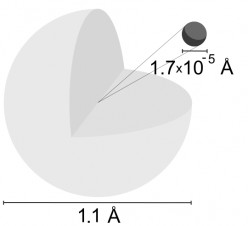
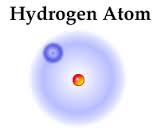
This picture they say is the first "photograph" of an atom (I disagree though).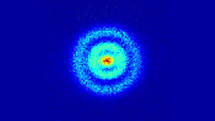
Anything that exist should have a shape that differentiate it from its surrounding nothingness just like the circumference of a circle differentiate it from its background.
I even found a picture of your quark,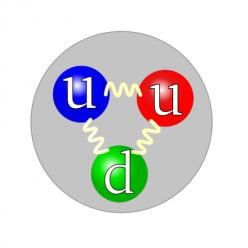
Wonder what camera they used for those pictures?
No, you and I both know they aren't photographs and we both know they aren't enlarged drawings of anything actually seen. The are depictions of what is there, drawn as something we can identify with and understand. A quark, for instance, does not two U's and a D with little squiggly lines between them. I very highly doubt that the components of a hydrogen atom are colored; if the nucleus was yellow and red, for instance, I would think the element would also show yellow (or orange) to our eyes. Nor does that hydrogen atom have a purple haze around it, representing electron probability in it's orbit - "representing" is the key word here.
Still think you need to take a physics/cosmology class, though, for the universe is most definitely growing. Space, the "place holder" of the universe is expanding - were it not so the universe would be infinite in size, with no possibility of another universe, yet we are hypothesizing there IS another universe next to ours and it is causing a "clumping" of galaxies at the edge of ours that is nearest it.
That is not true, if two objects move apart from each other, space is being created between them.
Space is a static concept not dynamic (static distance between two objects). Space is not like water that it fill up when something moves. Space is "absence" of things. There is nothing to be created there.
True, space is not like water, no one said it was, but that doesn't mean space can't be created. It can. Our universe is expanding, space is being created all the time.
I already provided the definition, were you not paying attention?
That is a relatively meaningless question. You can read about it here:
http://curious.astro.cornell.edu/questi … number=274
http://phys.org/news/2013-11-universe.htmlLooks like it, for even after rereading ypur posts I could only find your repeated assertion that space can be created not a definition of space.
That is a meaningless question but not because of the bunk you sent me. Space has no boundaries, universe is made of space and matter, hence has no boundaries. But in the picture in the link you gave me what is the black thing outside the universe?Think of space as the "zero" of the physical world. A place holder, with nothing in it, but without which nothing can be there, either.
Space = zero. It does not even hold. Of course space give shape by separating things without which everything would be one solid mass.
space cannot equal zero of course - one is a mathematical concept and one is a physical reality - but it is a decent analogy.
Yes, space holds things, or at least gives a "place" to exist. Without space there would be no such "place" and no "things" could exist. Not even a solid "mess 'o mass" of all the mass of the universe in one place.
The old "ether" concept similarly has at least some validity, even though "ether" included the concept that there was something there, some kind of mass completely invisible to us.Space is negatively defined. I meant space = 0 in the same way, zero objects or nothing.
Only a thing can hold, space is not a thing. It is 'place', a 'where'. Without space objects cannot exist because it is space that give "shape" to the object, the only necessity for being an object. If there is no space, then we get an infinite object but then "we" will not exist or evolve as there is no motion. And an infinite object is a contradiction because to be an object there should be space for the shape.
What has ether got to do with it? You are assuming an ether when you say space is created.Sounds like you are claiming that there are "things" and there is "nothing". No in between. Yet...there is energy. There are black holes. There are the forces of nature.
And there is space. Not a "thing", not "energy". Not a black hole and not gravity. A "place holder".Holder is a thing.
Energy is a concept that denotes motion but mostly a meaningless term like god.
Space is the absence of things between 2 things, place not place holder
If objects in the universe are moving away from one another, which would mean the distance between them is increasing, where is the space between them coming from?
Sorry, it could have been another thread, but I was sure it was directed at you.
You could also just crack open a dictionary to see the definition:
Space is the distance between two objects.
So sorry that you consider scientific articles "bunk", but that may be why you're so confused.
That doesn't preclude space from being created.
The background for the picture, obviously.If you cared to check that is the same definition I gave.
That is a bunk because it uses the words beyond its definitions, just like you are using now.
How do you create "distance"? You can create a thing but not "nothing".
That background in 3D is called space, the background around every object.
That distance is not an object. The space is always there. Do you carry "emptiness" in your pocket? Space is the same. Absence of things. When you move things apart the distance between the two increases does not mean something is created. It simply means that the area of nothingness between the two objects are more compared when they are near. We are putting an imaginary thing to measure the distance and from that arises the confusion of "created space".I did not see that, but I'll give the benefit.
I don't see how. Will you be explaining how those words are used beyond their definition?
Simple, look at the definition and then look at all the objects in the universe moving away from one another. That's how distance is created.
Where in the definition of space is the term "3D"?
No one said distance is an object.
No, it isn't, it is created as objects move apart, as the universe expands.
I have no idea what you're talking about.
Where in the definition of space is the term, "Absence of things"?
Hence, the space in between the objects is being created.
What imaginary thing?Created? ? Creation is an action mediated by one object on another.
Objects move apart won't create space, space is a static concept. Are you creating space when you move something apart in a closed room.?
The absence of things that separate two surfaces included in the definition otherwise it won't be two objects.
If there is only one object in the universe, the definition would be useless. Then it would only be "nothingness that give shape". Space can only be defined negatively because it is absence not a presence. Space is that which has no shape.
The imaginary thing is the tape you are using to measure.Like the creation of space where one object moves away from another?
And yet, that is exactly what is happening.
Citations and sources, please.
Yup.
But, there isn't one object in the universe, is there?
You keep redefining words to suit your failed agenda. I already asked you to present citations and sources to support your redefined words, but you have not done so.
Cesium atomic clocks measure time based on the radiation produced by the transition between the two hyperfine ground states, in other words, something that happened as opposed to one object's change in location.
Millions of years of evolution, of course. It's not like a bunch of atoms suddenly came together to from sentient beings, it is far more involved and complex than that.At the end of the day you correct it based on the sun though.Again it is still a change in location.
You mean god evolved but not humans?
This is so profound...love it! Science leads us to "The Parity Violation" and leaves the rest within the Quantum Realm....great idealism...
Related Discussions
- 80
The Scientific Evidence (Revelation Within Cell) For "Intelligence"
by sibtain bukhari 12 years ago
"The genetic code is a set of instructions and information""The set of instructions and information is intelligence""therefore genetic code is intelligence""All living things are developed by the genetic code""The genetic code is...
- 43
Are human beings intelligent?
by Gareth Pritchard 12 years ago
Are human beings intelligent?If you consider human beings to be intelligent then please try to quantify your opinion with some from of explanation.OrIf you consider human beings to not be intelligent then please try to quantify your opinion with some from of explanation.
- 21
With all the evidence for the theory of evolution, why do some people still beli
by Gaizy 13 years ago
With all the evidence for the theory of evolution, why do some people still believe otherwise.Once you have got your head around the theory of evolution, it's pretty obvious that it's close to how it must work. After all, animal breeders do the same thing when they selectively breed their stock....
- 32
Intelligent Life
by marinealways24 15 years ago
In your own words without quoting religious text or quoting atheist text, what are the main points that rule life being intelligent or ignorant?
- 187
The Intelligent Design of Fine tuning the Universe
by Alexander A. Villarasa 11 years ago
An article on National Geographic, in discussing "The Multiverse" stated it simply this way: "One can best get a sense of the fine-tuning problem by thinking about the gravitational force. If this force were much stronger than it actually is, the big bang would have collapsed...
- 261
A question about evolution
by aka-dj 15 years ago
I just posted the below in another thread, but, because it can get lost within all the other posts, I decided to repeat it in it's own new thread.Here it is:I am so amazed!!I look at the human body, and with what little I know, it is SSSOOO intricate, complex and perfectly well tuned to function,...




